March 3, 2017
Air Date: March 3, 2017
FULL SHOW
SEGMENTS
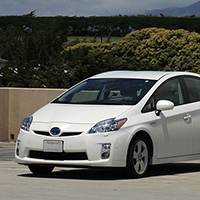
Auto Makers Move to Stall Efficiency
View the page for this story
President Obama’s EPA worked closely with industry to create a fuel economy standard of about 54 mpg starting in 2025. Now the auto industry lobby has asked EPA Administrator Scott Pruitt to consider rolling them back. Dan Becker of the Safe Climate Campaign explains to host Steve Curwood that the ambitious mileage requirements are key for U.S. goals under the Paris climate Agreement, and weakening them would cost American consumers while boosting short term industry profits. (11:50)

Exxon Cuts Oil Sands Reserves
View the page for this story
In one of the largest write-downs in the company’s history, billions of barrels of tar sands oil have been removed from ExxonMobil’s books -- a win for those who prefer that this Canadian oil stays in the ground. The Carbon Tracker Initiative analyst Andrew Grant told host Steve Curwood that recent low oil prices are driving this move, but if prices rise the tar sands could still be exploited. (05:00)

Beyond The Headlines
/ Peter DykstraView the page for this story
In this week’s Beyond the Headlines, host Steve Curwood and Peter Dykstra go back over some highlights of Mr. Trump’s February 28 address to Congress and reflect on past presidential environment-related comments. The pair discuss a possible Texas plan to poison millions of feral hogs, and the invention of that show business staple, limelight. (05:40)

Moose in Trouble
View the page for this story
Rising temperatures and a growing tick population are causing problems for moose in New England. So many ticks now live through mild winter temperatures and attack the calves, that few are surviving. Moose researcher Pete Pekins, professor of ecology at the University of New Hampshire, told Living on Earth’s Helen Palmer what can be done to preserve the moose population. (06:30)

Corporate Cash Derails Democracy
View the page for this story
Critics warned the 2010 Supreme Court ruling in favor of Citizen’s United would unleash a flood of corporate cash. U.S. Senator Sheldon Whitehouse, Democrat of Rhode Island, believes that has happened and among other effects, has allowed the fossil fuel industry to derail climate discussions and policy-making. The Senator speaks with host Steve Curwood about his new book, “Captured: The Corporate Infiltration of American Democracy." (16:00)

BirdNote: Robin Redbreast
/ Mary McCannView the page for this story
The “Robin RedBreast”, or European Robin, is a cultural touchstone in the U.K., where its seasonal arrival heralds spring and is a sign of good luck. BirdNote’s Mary McCann reveals the mythical origin story of this beloved bird. (02:00)
Show Credits and Funders
Show Transcript
HOST: Steve Curwood
GUESTS: Dan Becker, Andrew Grant, Peter Pekins, Sheldon Whitehouse
REPORTERS: Peter Dykstra, Mary McCann
[THEME]
CURWOOD: From Public Radio International, this is Living on Earth.
[THEME]
CURWOOD: I'm Steve Curwood. Automakers want to roll back new fuel economy standards, seeing more profit in big SUVs and trucks, but the climate cost could be high.
BECKER: If the Obama standards are implemented, they will save 12 billion barrels of oil, eliminate six billion metric tonnes of carbon dioxide pollution, and save consumers over $1 trillion at the gas pump over the life of the program. That's a lot.
CURWOOD: And as oil majors are forced to discount their tar sands reserves, European and US companies see a divergent energy future.
GRANT: Statoil, the Norwegian company, have a significant wind portfolio. Total, as well, the French company, have set themselves a target for 20 percent of their assets to be in renewables by 2035. With Exxon and some of the other US players, they've tended to focus more on oil and gas rather than trying to diversify into renewables.
CURWOOD: That and more, this week on Living on Earth. Stick around.
[NEWSBREAK MUSIC: Boards Of Canada “Zoetrope” from “In A Beautiful Place Out In The Country” (Warp Records 2000)]
[THEME]
Auto Makers Move to Stall Efficiency
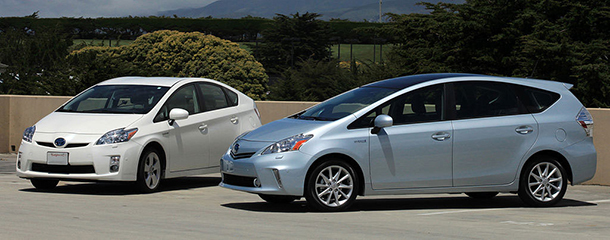
Toyota’s Prius hatchback hybrid-electric cars also have a streamlined shape for improved fuel efficiency. (Photo: Mario Roberto Duran Ortiz, Wikimedia Commons CC BY-SA 3.0)
CURWOOD: From PRI, and the Jennifer and Ted Stanley Studios at the University of Massachusetts Boston, this is Living on Earth. I’m Steve Curwood. Shortly after Scott Pruitt was sworn in as the new EPA Administrator, the Alliance of Automobile Manufacturers sent him a letter requesting that the agency re-examine the 2025 fuel economy standards. At the end of the Obama Administration these rules were made final. The petition alleges the rules would lead to extreme layoffs and added expenses in the domestic auto industry. We asked the Alliance for an interview, but they declined. So for some insight we turned to Dan Becker, director and founder of the Safe Climate Campaign.
Dan, welcome back to Living on Earth.
BECKER: Thanks a lot, Steve. It's great to be here.
CURWOOD: Now, we're talking with you today about the fuel economy standards that President Barack Obama wrapped up in the last days of his term, and how the industry is now fighting back against those. First, please remind us what are those standards?
BECKER: These are standards that the auto industry and environmentalists and the Obama administration negotiated for two years about. We all agreed that these were reasonable standards at the time. The auto companies signed letters of commitment saying that they wouldn't challenge the standards except during a midterm review, and what they require is that the average vehicle in 2025 get over 50 miles to the gallon. These are achieved by putting better technology on vehicles. It's auto mechanics, not rocket science - better engines, better transmissions, better aerodynamics, improved tires - and the auto companies have frankly been complying up until now, but they don't want to comply now that Mr. Trump is president and they think they can get a way out. So, they've petitioned the Trump administration to join them in trying to roll back these standards. They're being somewhat duplicitous in that they don't say how much they want them rolled back. They just say that they want the procedure undone that finalized the standards, and then they'll go from there.
CURWOOD: And we should note that we contacted the Alliance for Automobile Manufacturers to ask them to come on the program, and they declined. They said the letter simply speaks for itself that they had put out. But the letter, as you say, offers no details.
BECKER: The auto companies depend upon selling vehicles to the public and they know that a lot of the people who buy their vehicles care about their planet, care about the environment, care about their children's health, so they don't want to say that they're trying to run these standards off the road. They just want to do it quietly, so the letter that they sent to the Trump administration says, “We want changes in the procedure”, but this polite procedural request actually hides a demand to weaken the standards.
CURWOOD: So, in effect, they've asked the new EPA head Scott Pruitt to withdraw the standards claiming they have these procedural and substantive defects. How do you respond to those claims?
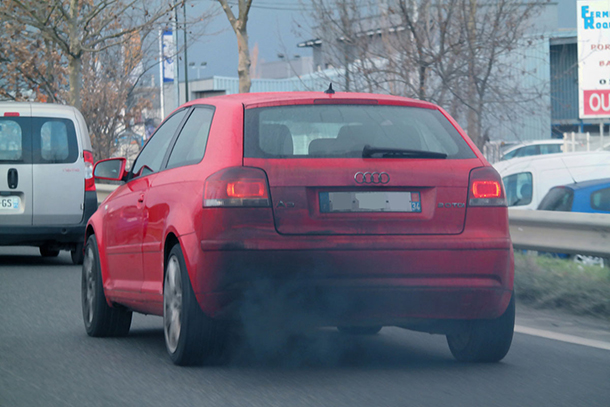
Tailpipe emissions from passenger cars are a major source of greenhouse gas emissions and pollutants harmful to human health. (Photo: Pittou2, Flickr CC BY-NC 2.0)
BECKER: The process that they're objecting to is a side agreement to the main agreement that they signed in 2012. The auto companies insisted on a reopener provision, a midterm review to reevaluate whether the standards were properly set in 2012. The government just finished that reevaluation. They spent $30 million over a couple years taking apart vehicles, looking at each component of the engines, of the transmissions, trying to figure out what would it cost the auto companies to make these vehicles more efficient. In the evaluation, they concluded that there was ample technology to meet the standards, that the technology worked, it was cost-effective -- In fact, more cost-effective than the administration had estimated in 2012 when they promulgated the standards -- and the industry had in fact become extremely profitable and was very successful selling these vehicles. The industry can meet these standards without making any electric cars and only a small number of hybrids, as long as they incorporate better technology on their conventional vehicles, and they've begun to do that. They need to continue.
CURWOOD: But what about the auto industry's claim that complying with the fuel economy standards would cause the loss of more than 1 million American jobs?
BECKER: It's sort of interesting. They say that there would be more than a million jobs lost, but their letter also indicates that that's more people that work at Ford, GM and Chrysler assembling vehicles. So they're not telling the truth. The auto industry has put 700,000 people to work since these standards started being implemented. That's because these standards require more technology, more time from workers assembling them, but the cost of that is incorporated into the vehicle, the consumer buys it, and they save money in turn because they're paying less for gas, and the savings of the gas pump more than make up for the better technology that they're buying.
CURWOOD: Tell me, how much carbon dioxide would the fuel economy standards potentially keep out of the atmosphere, and how important would these be to the US commitment on the Paris Agreement?
BECKER: If the Obama standards are implemented, they will save 12 billion barrels of oil, eliminate six billion metric tons of carbon dioxide pollution, and save consumers over a $1 trillion at the gas pump over the life of the program. That's a lot. That's the biggest single step any nation has ever taken on cutting global warming pollution. The Trump administration has already expressed hostility to the Clean Power Plan, the power plan rules that President Obama had developed. That was roughly half of what it would take to meet the Paris goals. The car standards would be a little less than another half, and so together that would devastate Paris agreement, but more importantly would mean six billion tons more carbon dioxide pollution in the atmosphere than without these rules. That's just the car rules.
CURWOOD: Now, where does California fit in here? It's had tighter emission standards than the rest of the country, but to what extent will it still be allowed to lead?

A September 1973 photo shows downtown Los Angeles darkened by heavy smog. Owing to California’s susceptibility to smog, the state is allowed to set stricter vehicle emissions rules than the federal government. (Photo: Gene Daniels / Environmental Protection Agency, CC government work)
BECKER: That's a very important question. When the Clean Air Act was first passed around 1970, California said, look, we've got much worse air pollution than other parts of the country, and we already have tighter rules in California that you're considering putting on the books for the country. It doesn't make sense for us to go backward, and so they were given a special provision that says they can have tougher air pollution emissions rules than the rest of the country, as long as EPA signs off on it. And they said, if auto companies as part of this negotiation agree to follow the federal rules set 2012 -- the 50-plus mile per gallon standards -- we will deem that to be compliant with California's tougher law. And there are about a dozen states that follow the California rules, all together it's about 40 percent of the car-buying public, and they will be able to enforce the California rules as well.
CURWOOD: The EPA has to agree for California to have its own rules. What if the Trump administration and its new EPA administrator, Mr. Pruitt, says, "No, no, no, no, California, you don't have that deal anymore".
BECKER: Well, it's pretty clear that California's waiver, the permission from EPA, is a one-time deal. Once, it's been granted, it cannot be revoked. So, California has the right to enforce the existing rules. They probably couldn't get the Trump administration to agree to tighter rules, but for the four years that Trump is going to be president, California will be able to implement the existing rules and so will the other states that follow California's lead.
CURWOOD: So, Dan, as I recall the last time you were on our program, I think it was 2010, you shared an elegy to the king of all gas guzzling vehicles, the Hummer. Just briefly, can you remind me why the Hummer has gone the way of the Dodo bird?
BECKER: The Hummer was an example of auto industry excess. It was too large, too polluting, too gas-guzzling, and even General Motors decided it needed to go the way of the dinosaur, whose fuels it was burning. And that's where the industry is making another mistake now. In 2008, the industry had become much too dependent upon gas guzzling polluting vehicles, and when gas prices shot up in 2007 and 2008, the industry was caught with its tailpipe down, and it was unable to make enough vehicles that consumers wanted to buy and was stuck with a lot of gas-guzzling SUVs and pickup trucks that consumers didn't want to buy. And so, two of companies, GM and Chrysler, went bankrupt, Ford hocked itself up to its blue oval for $24 billion, and the federal government came in with a bailout that saved the industry with $85 billion of taxpayer money, most of which was never paid back.

The Hummer H3, which had an average fuel economy of 15 mpg, was discontinued in 2010. (Photo: Marcus Quigmire, Wikimedia Commons CC BY-SA 2.0)
CURWOOD: And these days gas prices have dipped way down. What's that done for the auto industry? It seems that you go by their lots and the simple sedans are just backed up and not moving and the trucks are flying off the lots, aren't they?
BECKER: Well, that's true. The auto companies like to blame the consumer. They like to say, hey, we're just doing what the consumers want. They want gas-guzzling pickup trucks that are bigger than your garage, so we have to make them. The reality is that they make a lot of money on pickup trucks. They make a lot of money on SUVs because they're using antiquated technology that doesn't cost very much compared to more advanced car technology. They can offer a premium price, and Americans seem to want to buy them. Definitely the auto companies are taking advantage of the fact that gas prices are currently low. They're spending billions of dollars on ads to say it's cool to buy this big truck and be “Ford-tough.”
CURWOOD: And of course we have this law on the books that allows people to write off, I think, the first $25,000 of any vehicle that they're really...a big one that they're putting in to use for business, like a big pickup truck or big SUV...is really supporting the sale of those vehicles, as I understand it.
BECKER: It's an outrageous provision. Years ago, I actually wrote to the head of the IRS and asked that they investigate whether the people who were availing themselves of this loophole were actually using the vehicles in business, which the IRS assumed that they were, and I got a polite letter back saying, “Mind your own business. This is mine.” You and I and everyone listening to this show is subsidizing 6,000 pound-and-above, giant SUVs and gas-guzzling vehicles for people who allege that they're using them in their dentistry business or other activity, even if they're not.
CURWOOD: People really do seem to like these SUVs. You say there is a lot of heavy advertising to get people to like them, but what we know about consumer choices?
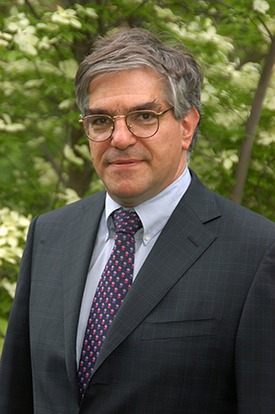
Dan Becker is the founder and director of the Safe Climate Campaign, based in Washington, D.C. (Photo: Dan Becker)
BECKER: Many consumers have been choosing to buy a vehicle that is more polluting, more gas-guzzling than the vehicle that they actually need. In some cases they see that a neighbor has one, and so they want to get what the neighbor got, but if you're not on a farm or you're not hauling material...If all you're doing is hauling a latte home from Starbucks, you don't really need an SUV.
CURWOOD: But, Dan, yeah, you may not need it, but you might want it. Isn't America all about choice? They're going to say, after all, “It's not just your car, but it's your freedom”, I think was one advertising line.
BECKER: We're not talking about restricting people's choices. We're saying that the auto companies need to add better technology to vehicles to make them go further on a gallon of gas, whether it's a hybrid or a Hummer. All I urge is that the industry be more responsible in making vehicles with better technology, so that when people buy whenever they buy, it pollutes a lot less.
CURWOOD: Dan, I want to thank you for taking the time with me today. Dan Becker is the Director and Founder of the Safe Climate Campaign.
BECKER: Thanks very much for having me on. It's been a pleasure.
Related links:
- The EPA’s Final Determination on the 2025 Vehicle GHG Emissions Standards
- The Alliance of Automobile Manufacturers letter to Administrator Pruitt
- NYTimes: “Automakers Call on E.P.A. Chief to Ease Fuel-Efficiency Standards”
- EPA: Vehicle Emissions California Waivers and Authorizations
- Historical background of the California emissions standards waiver
- Safe Climate Campaign
- “It Was Big While It Lasted”: Dan Becker’s Hummer elegy
[MUSIC: Harvey Reid, “Pieces Of Eight,” Of Wind and Water, Woodpecker Records]
CURWOOD: Coming up...why moose don’t like mild winters. Stay tuned to Living on Earth.
ANNOUNCER: Support for Living on Earth comes from the Gordon and Betty Moore Foundation, and from a friend of Sailors for the Sea, working with boaters to restore ocean health.
[CUTAWAY MUSIC: Jon Manasse/Jon Nakamatsu, “Three Preludes, Allegro ben rimato e deciso,” American Music For Clarinet & Piano, George Gershwin/arr.James Cohn, Harmondia Mundi USA]
Exxon Cuts Oil Sands Reserves

Exxon’s latest write-down of its tar sands reserves is valued at close to 20 billion dollars. (Photo: Mike Mozart, Flickr CC BY 2.0)
CURWOOD: It’s Living on Earth, I’m Steve Curwood. In the largest reserve rollback in the company’s history, ExxonMobil has knocked 3.5 billion barrels of tar sands oil in Canada off its books. If that oil were taken out of the ground at today’s prices, it would be worth close to $200 billion. Exxon’s total reserve of bankable oil is now just 20 billion barrels, the lowest in two decades. To help us navigate these numbers, we called up Andrew Grant, Lead Analyst with the Carbon Tracker Initiative in London.
GRANT: The reduction of reserves is driven essentially by the oil price. When I say "reserves," I mean the volume of oil that an oil company has a high confidence in producing and is economic to produce with today's technology. So, how do you know something is economic to produce, you compare it to the oil price. There's a standard test to that, which is to compare it to the previous year's average oil price. Last year, the average oil price dropped below the level that the oil sands project could be economically produced at, so, as a result, Exxon have had to take those barrels off their books. Now, that doesn't necessarily mean that they don't intend to produce those barrels. They still do, but they can't classify them as proved reserves at the moment.
CURWOOD: How much is a big deal is it that Exxon was required to tell investors...
GRANT: So, it depends on your persective. Now Exxon management view the current low oil price as temporary, so in their view, there's no impact at all on the underlying project. Investors on the other hand who are trying to get a window into how Exxon's business, how it works, what its cost structure is, might be a little more concerned that there are such large volumes of reserves contained in such high-cost projects, and last year oil sands was about 20 percent of Exxon's reserves.
CURWOOD: What other companies have written off, or pulled their investments from, the tar sands projects recently?
GRANT: Well, a number of projects. Just recently, ConocoPhillips, for example, debooked about a billion barrels of oil sands production. Shell have canceled their Pierre River project. They stopped their Carmen Creek oil sands project while it was being built which cost them $2 billion. Statoil, the Norwegian oil company have largely exited oil sands, and Total are reducing their oil sands exposure as well. So, certainly amongst the large oil companies there's been a bit of a move away from oil sands, driven by primarily cost but presumably also environmental grounds to an extent.
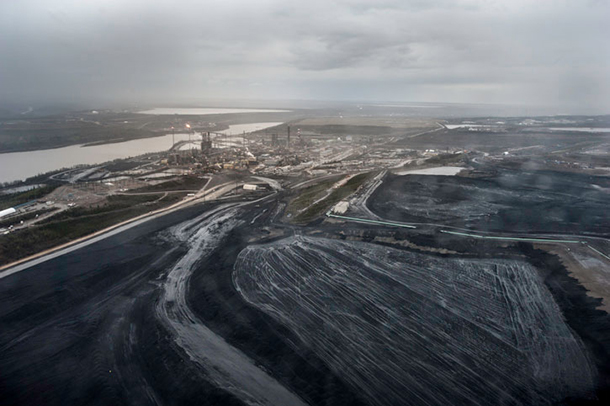
An aerial view of the Alberta Oil Sands. (Photo: Luc Forsyth, Flickr CC BY-NC 2.0)
CURWOOD: How would you say Exxon and the other big oil companies are doing in terms of their investment in renewables and low-carbon technology?
GRANT: Well, this is an areaw here there seems to be a divergence appearing between the different oil companies, particularly between European oil majors and those in the U.S. So, for example, in Europe, Statoil, the Norwegian oil company, have a significant wind portfolio, and they've got a target to increase that in the future. Total, as well, the French company, have set themselves a target for 20 percent of their assets to be in renewables by 2035. With Exxon and some of the other U.S. players, they've tended to focus more on their oil and gas, rather trying to diversify into renewables. I mean, it's not necessarily the case that an oil company that is worried about the environment should necessarily move into renewables. Renewables, it's a very, very different business to oil and gas. Now, there are some things that translate across. For example, oil and gas companies are great engineers, that might translate well to build off-shore wind installations, for example. But, otherwise, it's just a very different business model and a very different approach.
CURWOOD: So, I'm wondering if you're pointing us toward a smaller Exxon. Up until the drop in oil prices, Exxon was a key part of the American economy. It was in a lot of investor portfolios. It tended to at least perform as well as the Dow and the Standard & Poor indices and often outperform. In recent years, though, it's underperforming some of those indices. To what extent do you think Exxon might be in the process of shrinking?

Andrew Grant is an Analyst with the Carbon Tracker Initiative. (Photo: Carbon Tracker Initiative)
GRANT: Yeah, that's a good point. So in a world where global warming is limited, where the world follows up on its obligations under the Paris Agreement, a productive strategy for a large number of oil companies might be to, as ConocoPhillips called it "shrink to grow", whereby you focus on being the lowest cost producer, going for the lowest risk, highest return projects, and where those projects aren't available, you return your cash to shareholders to do as you wish. And if that means becoming a smaller company rather than growing for the sake of growing, then so be it.
CURWOOD: Andrew Grant is an analyst with the Carbon Tracker Initiative. Thanks so much, Andrew, for taking the time with us today.
GRANT: Thanks, Steve.
Related links:
- Exxon’s press release on the de-booking
- Andrew Grant bio
- Annual Form 10-K SEC filings for ExxonMobil
Beyond The Headlines
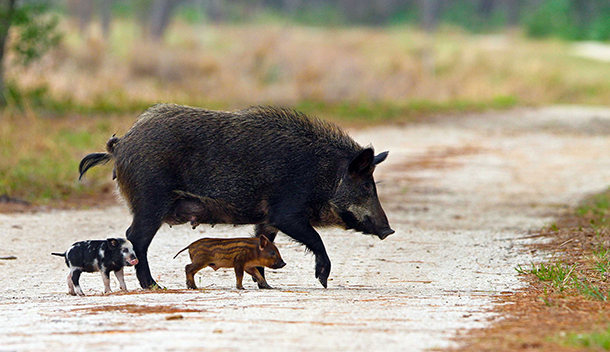
Millions of feral hogs could be hunted or poisoned with blood thinner if a bill drafted by Texas Agriculture Commissioner, Sid Miller is passed. (Photo: Craig ONeil, Flickr CC BY-NC-ND 2.0)
CURWOOD: Well, Exxon may be uncertain about oil sands, but the potential supply from Canada was on the mind of the President of the United States on February 28 in his first address to the assembled Congress, when he celebrated his decision to push through Keystone XL and other pipelines. Peter Dykstra of Environmental Health News, that’s EHN.org and DailyClimate.org, was glued to the speech and joins us now from Conyers, Georgia. And, Peter, we didn’t hear much about protecting the environment. What struck you?
DKYSTRA: Hi, Steve. If you take all annual Presidential speeches in the last fifty years, I want to point out something unique about Mr. Trump’s. Presidents historically use the speech to either drop some environmental platitudes or set goals and make promises that never happen.
CURWOOD: For instance?
DKYSTRA: Well, in 1993, Bill Clinton acknowledged the many failings of the Superfund program, promising to clean up the bureaucracy and maybe even clean up a few toxic sites. Both Presidents Bush promised clean coal, which is still either on the drawing board or in the poorhouse, given the multi-billions in failed investments. And the younger Bush stunned us all in 2006 by looking America in the eye and admitting that we’re addicted to oil. He laid out an ambitious series of fixes, which moved slowly under Obama and could stop in their tracks under Trump.
CURWOOD: So you’re saying President Trump’s ambitions on the environment won’t get anywhere?
DKYSTRA: Uh no, actually like it or not, Donald Trump’s environment-related promises stand the best chance of any President of being fulfilled. A compliant Congress and a zealous Cabinet stand ready to assist.
CURWOOD: All right, so let’s get to the specifics from Trump’s speech.
DKYSTRA: Well as you say, he mentioned completing the Dakota Access and Keystone XL pipelines. Check. Trump also renewed his vow to withdraw from the Trans Pacific Partnership, a view shared by many environmentalists, although for very different motives. He can’t kill the treaty, but U.S. withdrawal can paralyze it – or allow China to fill the void with its own trade treaty.
CURWOOD: And what about that other global agreement, the Paris Climate Agreement?
DKYSTRA: Well that didn’t come up, nor did any mention of climate change. He made passing mention of NAFTA, that other trade agreement also opposed by many environmentalists, and he acknowledged that clean air and clean water are good things.
CURWOOD: But hasn’t he been on a spree of executive orders to cut back air and water protections, I’m thinking of the Waters of the United States rule.
DKYSTRA: Well, yeah, but let’s think of that creatively. The President also repeated his campaign promise to "drain the swamp". Clean Water Act enforcement, including the Waters of the United States rule, make it hard to literally drain a swamp, but once you slash the budgets and workforce of the EPA and other agencies and obliterate environmental protection regulations, just name the swamp you want drained and it’s done.
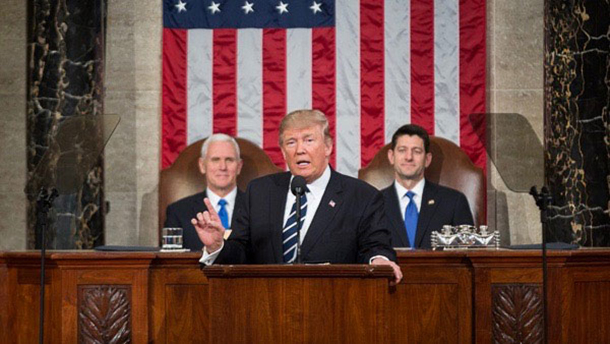
President Donald J. Trump addressed a joint session of Congress, February 28th, 2017. During his speech, Trump mentioned completing the Keystone XL and Dakota Access pipelines, among other subjects. (Photo: Office of the Speaker, Wikimedia Commons public domain)
CURWOOD: I have to admit I hadn’t thought of it that way.
DKYSTRA: Well, good for you.
CURWOOD: Alright, let’s move on. What else do you have?
DKYSTRA: Well Sid Miller is the Texas State Agriculture Commissioner, and a colorful one at that, given to social media outbursts about how a huge, secret Jihadist training camp looms outside of Houston, its thousands of soldiers poised to end America as we know it.
CURWOOD: Uh, OK, I mean one would think the guy in charge of so much of Texas’s open space could find such a camp if it really existed.
DKYSTRA: Yeah, but there’s something else Mr. Miller wants to do to end America as we know it for a couple of million four-legged residents. There are up to 2.5 million feral hogs, in Texas, some over 400 pounds, and they’re making a mess of crop and pasture land, rooting up huge holes for horses or cattle to break a leg in. While in the state Senate, Miller drafted a bill to hunt feral hogs by helicopter. It passed. Others have looked into contraceptives for hogs, but that proved a little tricky.
CURWOOD: Those kind of sound like wacky solutions to me.
DKYSTRA: Yeah, the kind that Wile E. Coyote would deploy to catch the Road Runner. And this one even has a Road Runner-ish name: The Kaput Feral Hog Lure.
CURWOOD: No doubt manufactured by the ACME Company. How does it work?
DKYSTRA: Well, the Kaput Feral Hog Lure is regular old food that pigs like, laced with Warfarin, a blood thinner that’s sold on TV for humans, but with a big enough dose, it’s said, to be lethal to hogs.
CURWOOD: Anybody objecting to this?
DKYSTRA: Well, hog hunters in Texas aren’t thrilled, since the warfarin turns the hog fat blue.
CURWOOD: So I guess we’ll all get to see if Commissioner Miller is more of a genius than Wile E. Coyote. Hey Peter, it’s time to rummage through our history vault. What did you bring this week?
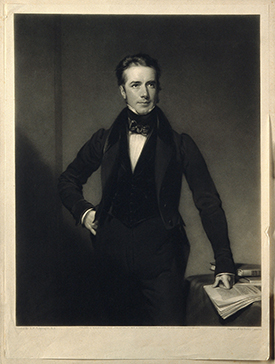
The engineer Thomas Drummond is credited with inventing the limelight, a type of torch that became wildly popular because it was much safer than open-flame torches at the turn of the 19th century. (Photo: Wellcome images, Wikimedia Commons public domain)
DKYSTRA: Well, if there are two things Americans really love, how ’bout the limelight and organizational train wrecks, like the one at the end of last week’s Oscar ceremonies.
Since just about everybody knows about the train wreck with the Best Picture award, let’s talk about limelight, and how it became a cliché for showbiz glory.
CURWOOD: OK.
DKYSTRA: Well, it’s said that on March 5, 1830, an engineer named Thomas Drummond exhibited his lighting invention to a crowd of bigwigs at the Tower of London. It was called the incandescent calcium oxide lamp. It worked by focusing an intense flame on a piece of quicklime, causing a bright glow. Drummond’s invention hit the big time in theaters, where his limelight torches were considered less of a fire risk than open-flame torches. They also became all the rage for coastal lighthouses, and were in widespread use ‘til the turn of the century.
CURWOOD: And I guess by start of the 20th century, electric and gas light were taking over, both available, and safer than anything with an open flame, right?
DKYSTRA: Correct. There are some sources that say Drummond had a working version of this light as early as 1816, and other historians say he wasn’t the first limelighter at all. Some texts say the credit should go to a British nobleman with the exquisitely Dickensian name of Sir Goldsworthy Gurney.
CURWOOD: And the exquisitely named Peter Dykstra is with Environmental Health News. That's EHN.org and DailyClimate.org. We’ll talk to you again real soon, Peter.
DYKSTRA: OK, Steve. Thanks a lot. Talk to you soon.
CURWOOD: And there’s more on these stories at our website, LOE.org.
Related links:
- Daily Climate’s overview of past Presidential green promises
- The Texas Tribune: “On Sid Miller’s Facebook, fake news flows freely”
- NBCDFW: “Texas Ag Chief OKs Use of Poison to Bring a Hogpocalypse”
- Science Newsletter profile on Thomas Drummond and Limelight
[MUSIC: https://www.youtube.com/watch?v=EkASKHPRCuU
Theme from the film “Limelight,” written by Charles Chaplin, distributed by United Artists-The Criterion Collection]
Moose in Trouble
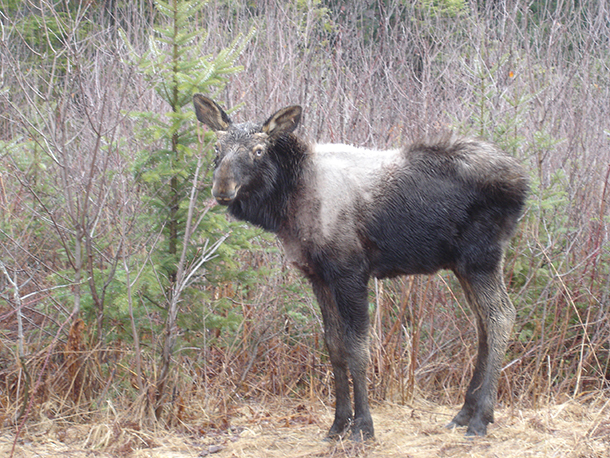
Bull moose calf with a severe tick infestation. (Photo: Pete Pekins)
CURWOOD: And now – a poem from Arlo Guthrie…
Mooses come walking over the hill
Mooses come walking, they rarely stand still
When mooses come walking they go where they will
When mooses come walking over the hill
[SPOKEN WORD: Arlo Guthrie on More Together Again, recorded live at Wolf Trap, Vienna, Virginia, 1993, copyright Rising Son Records, all rights reserved]
CURWOOD: Many of you may have read that poem to a child tucked up in bed, and imagined the stately moose plodding purposefully over the hill, but the latest news about moose is much less soporific. In northern New England, they number some 70,000, but now our changing weather seems to be throwing the balance of nature out of kilter and giving an edge to perhaps the most important enemy of the moose – blood-sucking ticks. This has alarmed moose researchers including Professor Peter Pekins, the chairman of the natural resources and environment department of the University of New Hampshire. He spoke with Living on Earth’s Helen Palmer.
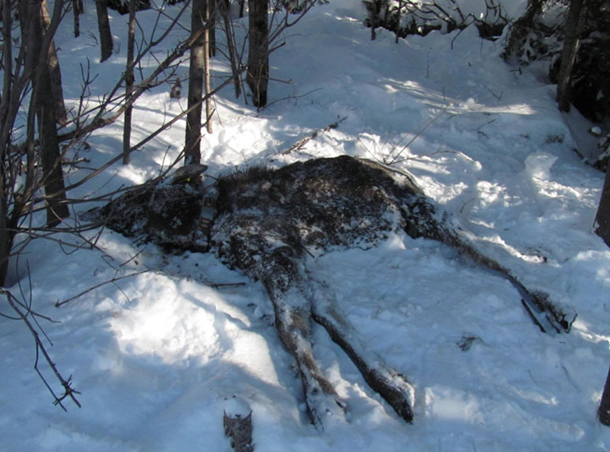
Moose calves are most likely to succumb to ticks in the wintertime. (Photo: Pete Pekins)
PALMER: The reports that I read are very upsetting. Tell me what exactly is going on with the moose?
PEKINS: For last three years, the state of New Hampshire through the University of New Hampshire and the state of Maine have been following well over a hundred moose per year that are captured in January, and we follow the mortality rate. We measure the mortality rate of these animals and the productivity of these animals. For the last three years, unfortunately, both states have averaged right around 70 percent mortality of calves and yet lower productivity than we expect from adults.
PALMER: When you say productivity, what does productivity mean in the context of a moose?
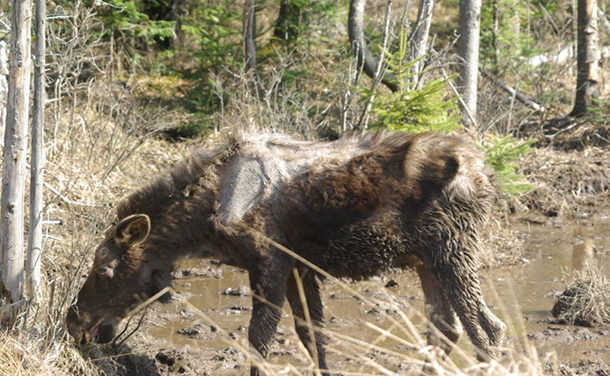
Moose calves are at a higher risk of dying as a result of a heavy tick load because of their small size and inability to replenish lost blood. (Photo: Pete Pekins)
PEKINS: Productivity refers to the number of calves produced per cow and then the survival of those calves over time. And this has been 99 percent associated with extreme heavy loads of the winter tick, a parasite of the moose. The tick load these calves are carrying eventually results in their death, and this death occurs in late March through mid-April. Probably 85 percent of the deaths occur at that time, and that's directly associated with the adult female tick taking her blood meal which can be two to four milliliters of blood per tick.
PALMER: So, how many ticks would there typically be on a moose? I mean, what we talking about?
PEKINS: Right. So, the range has been 35,000 to 95,000 ticks per hide, and, in general, if you're over 30,000 ticks, you're going to have a problem. So these animals simply die from acute anemia and massive weight loss because they simply can't replace this blood loss volume that quickly.
PALMER: Well, typically, the host and the parasite are in pretty good equilibrium. What exactly is it that's changed the equilibrium here?
PEKINS: You need two fundamental occurrences to have this massive mortality. One is you need a very high moose density and two, you need cooperative weather. So, over time as our weather patterns have changed, it's not surprising that we would have these events, but to have three in a row was really unprecedented in our knowledge of this host parasite system.
PALMER: So, what can you do about it? I mean, can you treat the moose to get rid of the ticks?
PEKINS: Well, you know, it's funny. That's what the typical question is, but that raises all types of issues. Should we be treating wildlife to break up a natural system? In New Hampshire, we have a saying, "Keep the wild in wildlife", and the other way to think about this is, perhaps you just bring down the density of moose.
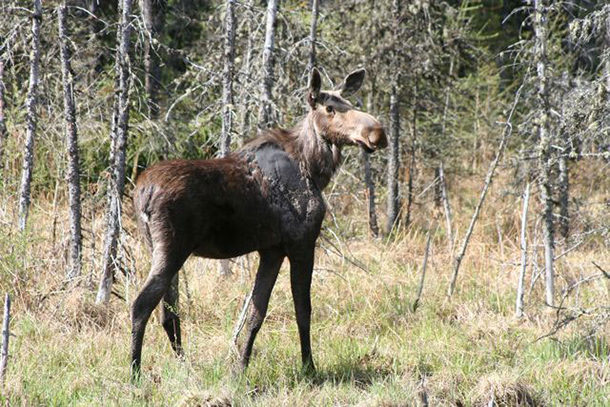
A female moose who has lost weight, hair, and skin because of the moose tick. (Photo: Jennifer Jilks, Flickr CC BY-NC 2.0)
PALMER: What about treating the landscape with insecticide? Would that work?
PEKINS: In theory it would, but the other thing to remember is, you're talking about a very large geographic area. You're also talking about an animal that has a very large home range, and, in general, the public is not too supportive of large spraying operations, be they herbicides or insecticides or whatever. I'm not an advocate of it. Could you do it? Yes, nothing is impossible, but is that the right choice? I don't think many people with strong environmental values would favor that type of interjection of human management.
PALMER: So, basically what is the answer if you can't really treat the moose and you can't really spray insecticides to kill the ticks. How is this program going to be solved?
PEKINS: You can hope the weather changes. [LAUGHS.] Some people, I think, have strong beliefs that climate change is not real, and so the argument for that would be that, by having as many animals left on the landscape, that that larger population would be there to respond when winter starts occurring around the first week in November again. What's interesting to think about is there's a growing proportion of the human population that doesn't think winter begins in November anymore in New England, and so the change is very real, and so you're really left at either accepting this or the only proactive approach would be to institute a higher harvest to bring down the density of moose because that could effectively break this relationship. You would reduce mortality of calves, and you would increase the relative health and condition of the adult moose.
PALMER: So, you're talking about hunting moose or maybe just actually a wildlife cull.
PEKINS: I would be referring to harvest, not a cull, and that can be done in a reasonably conservative manner if an state or agency decided to go that route. I personally think that there would be a bit of a social outcry about that because it's a very counterintuitive approach to what is clearly a slow decline in a population.
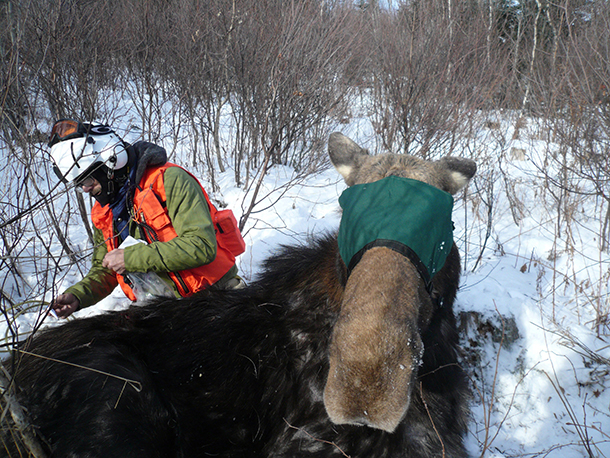
A New Hampshire moose being collared in 2014 for a study of the impact of winter tick and other health threats. (Photo: New Hampshire Fish and Game)
PALMER: I would think that most people would prefer the idea of a selective harvest or reduction of the population to seeing these poor calves effectively wasting away.
PEKINS: It's an image that doesn't leave your mind, and you are left with this feeling that, “What a waste.” The other part of this that goes on is that the adults are also not in optimal condition. We know our productivity levels are lower. We know that yearling moose, that 10 years ago about 30 percent of yearling females were breeding. We have almost no yearling females breeding. It’s my hypothesis that this is the physiological penalty they pay for a high tick load. They don't pay with their life, but they pay with their productivity. And this is all contributing into this decline in the population.
CURWOOD: Peter Pekins is a Professor of Wildlife Ecology at University of New Hampshire in Durham. He spoke with Living on Earth’s Helen Palmer.
Related links:
- NYTimes: “Ticks, Thriving in Warm Weather, Take a Ghastly Toll on New England Moose”
- National Geographic: “What's a Ghost Moose? How Ticks Are Killing an Iconic Animal”
- Washington Post: “Bled, scraped and starved to death: Exploding tick numbers threaten this New England beast”
- About Professor Pete Pekins
[MUSIC: Jon Manasse/Jon Nakamatsu, “I Got Rhythm,” from “Girl Crazy,” American Music For Clarinet & Piano, George Gershwin/arr.James Cohn]
CURWOOD: Coming up...a Democratic US Senator on the climate risks of campaign cash. That’s just ahead here on Living on Earth. Stay tuned.
ANNOUNCER: Funding for Living on Earth comes from you, our listeners, and United Technologies - combining passion for science with engineering to create solutions designed for sustainability in the aerospace, food refrigeration and building industries. UTC companies such as Otis, Carrier, Pratt & Whitney and UTC Aerospace Systems are helping to move the world forward.
This is PRI, Public Radio International.
[CUTAWAY MUSIC: Haugaard & Hoirup, “Johsefin’s Waltz,” Rejsedage/Traveling, traditional, published by Haugaard & Hoirup]
Corporate Cash Derails Democracy
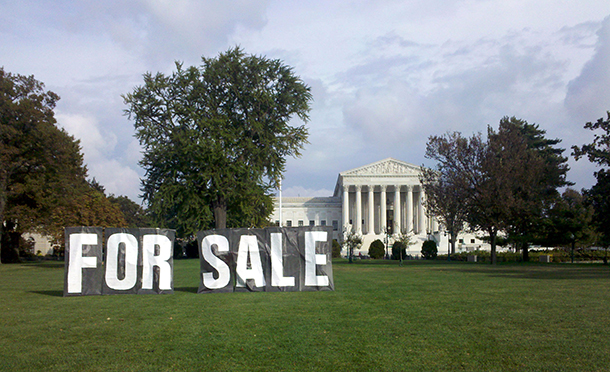
In 2010, Citizens United vs. Federal Elections Commission opened the door for corporate money and influence in US elections. Following the decision, opponents of the decision took to Washington D.C. in protest. (Photo: Takomabibelot, Flickr CC BY-NC-ND 2.0)
CURWOOD: It’s Living on Earth, I’m Steve Curwood. When the US Supreme Court ruled in favor of the Citizen’s United claim that limits on corporate campaign contributions inhibit free speech, critics said the already heavy influence of money in politics was now freed to crush our democracy. Those critics include Senator Sheldon Whitehouse, Democrat of Rhode Island.
In his new book, “Captured: The Corporate Infiltration of American Democracy”, the Senator explores how big business has deflected and redirected important public programs, especially those attempting to protect the climate.
Senator Whitehouse, welcome to Living on Earth.
WHITEHOUSE: Thank you. Wonderful to be with you. Appreciate you having me on.
CURWOOD: Tell me, first, what is the corporate agenda, and whose views, specifically, does it reflect?
WHITEHOUSE: Well, my description of it is that it is an infrastructure that can be deployed on behalf of participating industries to offset or delay regulation and to impede legislation wherever a company's products end up creating any kind of public health risks or otherwise.
CURWOOD: What kind of risks build up? What are you talking about here?
WHITEHOUSE: One really, really obvious risk is simply the extent of carbon dioxide in the atmosphere and the climbing acidification of the seas. You can perhaps deny or try to explain the early stages of that, but at some point it becomes so physically obvious in the real, tangible world that there's no denying it any longer.
CURWOOD: In your new book, "Captured", you write that there's often a pattern to the strategies that fossil fuel companies take to challenge climate policy. I think you describe it as a “1-2-3 step. Deny the science. Question the motives, and exaggerate the costs.” When have you witnessed this process and why is it so effective in your view?
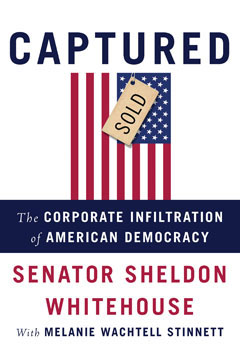
Senator Whitehouse’s book is “Captured: The Corporate Infiltration of American Democracy”. (Photo: The New Press)
WHITEHOUSE: Well, it's happened over and over again, and it's been at the heart of the climate change battle. Its general purpose is to create doubt in the public mind that proceeding to deal with the hazard would be a good thing. So, the first thing you do is, you deny the science or you put alternate science next to it to manufacture doubt. Then it helps to go after the other side as if it had a special interest, as if it had a conflict of interest, and that way the industry’s able to offset the fact that it IS a special interest that has THE conflict of interest, and then you can put a general kind of note of caution over the whole thing by suggesting to people that, if you fix this, it's actually going to cost a bucket of money, and it's going to cost jobs, and it's going to be really, really bad for everybody. So, until the science is settled, let's not rush into things.
CURWOOD: We talk a lot today about fake news. In your book you mention fake research in which fossil fuel companies pay consultants to write poorly scholarly articles supporting their interests. You also write that this concept of corporate sponsored research played a role in a case you brought against the lead paint industry as Rhode Island's Attorney General. Please tell us what happened in that case.
WHITEHOUSE: Rhode Island has a lot of old homes, painted back in an era when lead paint was common, and the result was that the number one public health threat to Rhode Island children was lead toxicity from lead paint ingestion. And so I decided that Rhode Island should bring an action against the lead paint industry. Well, the lead paint industry lawyered up phenomenally, and some of their plan was to hire people to write law review articles and then plant those articles, so that when the court got around to writing its decision, it would run the usual legal research tools to see who had written relevant stuff, and sure enough there would be the articles.
CURWOOD: What was the effect of that purchased research?
WHITEHOUSE: Well, unfortunately, in its decision, which threw out our jury verdict and turned the case to the defendants, the Rhode Island Supreme Court actually quoted some of that material. So it had an effect.
CURWOOD: The Citizens United Supreme Court ruling is the central focus of your new book. You quoted a defeated Congressman who in its aftermath described the court’s decision as the "polluters triumph". How did this ruling empower big polluters?
WHITEHOUSE: It allowed them to spend unlimited amounts of money. Before Citizens United even a very big polluter was very limited in what they could do to influence politics. But after Citizens United, they were able to put an entire architecture of new political artillery out, much of it firing from the shadows, dark money that you can’t identify the source of readily, and that changed the tone a lot in Washington. I saw in in the Senate, from 2007 to 2009, there was a lot of bipartisan activity on climate. 2010 comes Citizens United, from that month forward there was never another Republican-sponsored significant bill on carbon emissions.
CURWOOD: Now, you write that talking to Republican senators these days about climate change is a bit like talking to prisoners about escape. What do you mean by that, and what options do you think those Republican senators have these days?
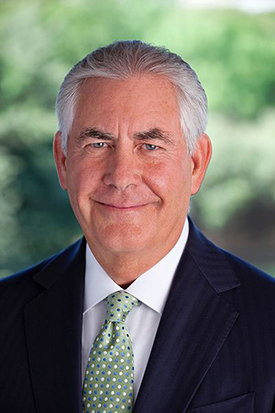
U.S. Secretary of State Rex Tillerson previously served as the CEO of ExxonMobil. According to Senator Whitehouse, the company’s public position on climate change hasn’t always lined up with its actions in Congress. (Photo: Office of the President-elect, Wikimedia Commons CC BY 4.0)
WHITEHOUSE: Well, the point that I try to push back on is the notion that climate change is inherently a partisan issue. It's old-fashioned, smelly, special-interest, special pleading just like legislatures have known since the dawn of time. But what they have done, the fossil fuel industry, with this new Citizens United artillery is to focus on crushing any Republican who might have the temerity to start working on climate change. So, it has become politically impossible for Republicans to do that, but that doesn't mean that they don't want to do, that they wouldn't be interested in it if they could find a safe path. So, that's what I mean. It's like talking to a prisoner about escape, and at some point they get furtive, like you might talk to a prisoner about escape, and they look around to see, are the guards watching, is anybody listening?
The other interesting piece is that particularly with the new report by the three Republican former Treasury Secretaries supporting a carbon fee as a solution, there's actually quite good agreement on what the getaway car would like, if the prisoners could escape. Everybody kind of agrees that we will work with the Republicans on a carbon fee, if that's the way they want to solve this problem. But in between Republicans who are interested in doing this and the Republican-supported solution is this barbed wire fence with klieg lights and gun towers that the fossil fuel industry has put up that prevents any Republican from going.
CURWOOD: So, you're talking about the carbon dividend plan that former Treasury Secretary Jim Baker and George Schultz and Hank Paulson recently advanced, a carbon tax that would be rebated to everyone.
WHITEHOUSE: Yes.
CURWOOD: What do Republican senators say to you privately, out of earshot of the fossil fuel industry?
WHITEHOUSE: Well, I think the concern is that, is it politically survivable to make that move yet? And I don't think they're getting very strong signals that that is the case. Three treasury secretaries who no longer hold office don't really amount to hill of beans in the power politics of Washington. So, what I have urged is that it's really, really important that the rest of corporate America, many of whom have really good carbon policies, step up and take a real interest and go to Republican senators and say to them in a conversation that is meaningful, "We pledge to have your back. Come what may, we pledge to have your back."
CURWOOD: Any sign of that so far?
WHITEHOUSE: It's beginning to emerge. A considerable number of CEOs understand that this is a problem that they need to address. I think it'll happen.
CURWOOD: Now, you noted that in the 2016 presidential election, Hillary Clinton was more successful at attracting secret, that is, dark money and those really big donors than previous Democrats, and that that somehow gives you hope. Why?
WHITEHOUSE: I'm the prime sponsor of the Disclose Act which would shine spotlights into the dark money operations, and I was trying to recruit Republican co-sponsors, and one of the fellows I talked to said, "Well, you know, what you really need to do, Sheldon, is you need to raise a lot of dark money on your side because once it looks like it's going to be a tie, I think we'd be ready to get rid of the stuff. Everybody knows it's not good, but while we Republicans have a 5-to-1 or 8-to1 or 10-to-1 advantage in the dark money, why would we ever give away that advantage?" So, perhaps the use of dark money is evening, and that might give people an excuse to begin to turn against it, but ultimately I think it's going to be popular pressure, people just revolted by all this dark money floating around in the elections that will make the difference. I continue to believe that we can and will do this. I take a lot of heart from young voters who are really determined about this. Even young Republican voters are very strong in wanting action on climate. So, the island of denial that these political figures have to live on is getting smaller and smaller and smaller, and the fossil fuel industry at some point is going to be defeated.
CURWOOD: You note that, unlike most Republican presidential candidates in 2016, our new president hasn't always aligned with the fossil fuel industry on climate change. What degree of corporate influence in general and fossil fuel industry in particular can we expect from this new administration, and what sort of climate policy?
WHITEHOUSE: Well, that's going to be hard to tell. If they continue to trudge along the way they've trudged through the early months of being president-elect and then president, then we're not on a good trajectory at all. There are too many climate deniers in the White House. There're too many climate deniers in the Cabinet. However, if you go back to 2009, as you pointed out, President Trump once took out a full page ad in New York Times saying that climate science was irrefutable and the consequences of climate change would be catastrophic and irreversible, and he and his three children are all on record.

Ready for Hillary was a super PAC supporting the 2016 Clinton presidential campaign. Candidates are supposedly unaffiliated with super PACS, but the line separating the organization from the politician is often blurred. Hillary Clinton amassed more campaign financial support through super PACs in her 2016 bid than any other candidate
CURWOOD: Looking at the Trump administration, President Trump hired Rex Tillerson, the former CEO of America's largest fossil fuel company Exxon. In your view, what does that mean for the prospects of dealing with climate disruption by this administration?
WHITEHOUSE: Well, Secretary Tillerson has a horrible record from his private sector career. Exxon, for decades, covered up and hid and misled the public about the climate science that it not only knew, but was making investments based on, and now that he's Secretary of State, what one can hope for is that, in the same way that it took President Nixon to go to China because his anti-Communist bona fides were so great, maybe Tillerson can do something useful about climate change. Certainly up to the life he has lived up until now, he will not have much of an obituary if he doesn't. But the danger is that he will continue, true to proven form over many, many, many, many years, and serve the interests of the fossil fuel industry and continue to postpone any solution.
CURWOOD: Well, as you know, Senator, Exxon is now in the record favoring a carbon tax, but I think they also like the notion of indemnity for the fossil fuel companies if there is such a tax.
WHITEHOUSE: Well, you know, they say that they're on record for a climate change bill of some kind. They say that they understand that climate change is real. They say they'll accept a carbon fee, but in point of fact from my position in the Senate, every single piece of their political artillery is warning every person in the Senate, “Don't you dare.” Their entire political operation never budged and remains resolutely opposed to any type of climate fee, and I simply cannot believe that the CEO of the company doesn't know and didn't know what his entire political operation continued to do, notwithstanding the stated change in policy.
CURWOOD: Why do you care so much about the climate? Recently you famously were up at four in the morning in the Senate chamber doing a chemistry experiment to show how CO2 acidifies water.
WHITEHOUSE: Yes. Well, for starters I represent the ocean state, and Rhode Island has a long, long, long tradition of loving, enjoying, and working with the sea. We're also a small state, and when you look at the dangers of sea level rise we don't have lots of space to give back to the oceans. I also think that we’re being tested as a species. We have to figure out how to work together, how to trust science, and how to get this next challenge right.
CURWOOD: One could come away from your book, Senator, saying that the corporate influence on politics, particularly climate but in others as well, threatens the very existence of American democracy. How accurate is that view?
WHITEHOUSE: The worry that you express is at the heart of why I wrote the book. American democracy is making bad decisions because it has been occupied by this unprecedented corporate political power. And if the kickback against that by a dissatisfied and frustrated American public is against American democracy itself, then I think we are at risk of really damaging something that has been handed down to us over many generations, and it will be a tragedy because it will have been done in a misdiagnosis of the problem.
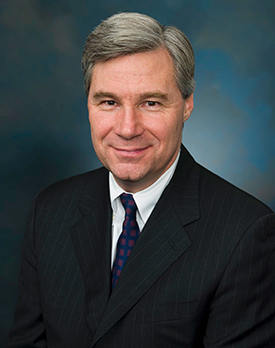
Senator Sheldon Whitehouse (D-RI). (Photo: United States Senate, Wikimedia Commons CC BY 4.0)
CURWOOD: Facts are important, but it's hard to use facts to change minds when emotions are so high. What's the human emotional connection to the threat of climate disruption that you think will be able to make the difference now in this fight?
WHITEHOUSE: There used to be a guy named Paul Harvey who did a radio show. At the end of it, he always said, "Stand by for the end of the story," and he'd come back on and then there would be some, like, twist in the story at the end that gave a whole new meaning to what had taken place before, and that reminds me, Americans like to know the whole story. This is not just a question of jobs versus polar bears. This is a question of a huge industry that has created an enormous array of front groups and shell corporations to pull a fast one on the American public. So, you really have to go, pull back the curtain, and show the American public the whole story. And I think, if they do, that's a plot twist that will get new interest in this. Nobody likes to have a big industry pull a fast one on them, and that's fundamentally what's happening here.
CURWOOD: So, as Paul Harvey would say, "Now, for the rest of the story."
WHITEHOUSE: "Now, for the rest of the story."
CURWOOD: Democrat Sheldon Whitehouse is US Senator from Rhode Island. His new book is called, "Captured: The Corporate Infiltration of American Democracy". Thanks so much, Senator, for taking the time today.
WHITEHOUSE: My pleasure. Thank you.
Related links:
- Captured: The Corporate Infiltration of American Democracy
- About US Senator Sheldon Whitehouse (D-RI)
BirdNote: Robin Redbreast

The European Robin. (Photo: Tony Morris)
[MUSIC - BIRDNOTE® THEME]
CURWOOD: One of the most beloved harbingers of spring is the robin. But as Mary McCann points out in today’s BirdNote, our devotion to the robin is nothing compared to feelings for the pint-sized version across the pond.
BirdNote®
The Robin’s Namesake
The American Robin rates as one of our best-known birds.
[American Robin song, http://macaulaylibrary.org/audio/168300, 0.07-.09]
The roots of its common name lie in Europe, though, and a distant relative, a bird not much bigger than a chickadee: the European Robin.
[European Robin song, http://macaulaylibrary.org/audio/162860, 0.06-.09]
Like the American Robin, the European Robin is a bird of yards and gardens and has a red-orange breast, so it’s often called “Robin Red-Breast,” or just “Robin.”
[European Robin song, http://macaulaylibrary.org/audio/162860, 0.06-.09]
And it’s something of a cultural touchstone in the UK. The Robin Red-Breast’s seasonal arrival harkens Spring. It’s been said to signal good luck. And its likeness turns up everywhere from Mother Goose rhymes, Peter Rabbit stories, and whiskey labels to postage stamps and Christmas cards. The little robin pops up in European folklore, too, including Norse mythology, where it was sacred to mighty Thor.
And as for its breast color — One account has it that when the robin visited souls in Purgatory to refresh them with water, its breast was scorched to its current shade.
On at least two occasions, the Robin Red-Breast has won the popular vote to become the UK’s unofficial national bird.
So clearly, although small, it packs a mighty, symbolic punch.
[European Robin song, http://macaulaylibrary.org/audio/162860, 0.06-.09]
I’m Mary McCann.
###
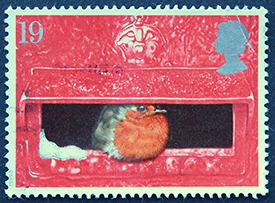
A United Kingdom postage stamp starring Robin Red-Breast (Photo: P. Khoo)
Written by Bob Sundstrom
Bird sounds provided by The Macaulay Library of Natural Sounds at the Cornell Lab of Ornithology, Ithaca, New York.
168300 recorded by Wilbur L Hershberger and 162860 recorded by Gregory F Budney.
BirdNote’s theme music was composed and played by Nancy Rumbel and John Kessler.
Producer: John Kessler
Executive Producer: Sallie Bodie
© 2017 Tune In to Nature.org February 2017 Narrator: Mary McCann
Voted national bird: http://www.bbc.com/news/uk-33090043
Other sources: http://newmexicobirds.blogspot.com/2009/03/little-robin-redbreast.html?m=1
http://birdnote.org/show/robins-namesake
CURWOOD: And if you’ve never seen Robin Redbreast, or even if you have, flutter over to our website LOE.org for some photos.
Related links:
- “The Robin’s Namesake” on the BirdNote website
- Learn more about the European Robin on the BBC Nature website
[MUSIC: Lawrence Blatt, “Flying Over Ellis Island,” Longitudes and Latitudes, LMB Music]
Living on Earth is produced by the World Media Foundation. Our crew includes Naomi Arenberg, Bobby Bascomb, Savannah Christiansen, Jenni Doering, Noble Ingram, Jaime Kaiser, Don Lyman, Alex Metzger, Kit Norton, Helen Palmer, Adelaide Chen, and Jolanda Omari. Tom Tiger engineered our show, with help from John Jessoe and Jake Rego. Alison Lirish Dean composed our themes. You can hear us anytime at LOE.org -- and like us, please, on our Facebook page -- PRI’s Living on Earth. And we tweet from @LivingOnEarth. I'm Steve Curwood. Thanks for listening.
ANNOUNCER: Funding for Living on Earth comes you, our listeners, and from the University of Massachusetts, Boston, in association with its School for the Environment, developing the next generation of environmental leaders. And from the Grantham Foundation for the protection of the environment, supporting strategic communications and collaboration in solving the world’s most pressing environmental problems. Support also comes from the Energy Foundation, serving the public interest by helping to build a strong, clean, energy economy, from Carl and Judy Ferenbach of Boston, Massachusetts and from SolarCity, America’s solar power provider. SolarCity is dedicated to revolutionizing the way energy is delivered by giving customers a renewable alternative to fossil fuels. Information at 888-997-1703. That’s 888-997-1703.
ANNOUNCER: PRI. Public Radio International.
Living on Earth wants to hear from you!
Living on Earth
62 Calef Highway, Suite 212
Lee, NH 03861
Telephone: 617-287-4121
E-mail: comments@loe.org
Newsletter [Click here]
Donate to Living on Earth!
Living on Earth is an independent media program and relies entirely on contributions from listeners and institutions supporting public service. Please donate now to preserve an independent environmental voice.
NewsletterLiving on Earth offers a weekly delivery of the show's rundown to your mailbox. Sign up for our newsletter today!
 Sailors For The Sea: Be the change you want to sea.
Sailors For The Sea: Be the change you want to sea.
 The Grantham Foundation for the Protection of the Environment: Committed to protecting and improving the health of the global environment.
The Grantham Foundation for the Protection of the Environment: Committed to protecting and improving the health of the global environment.
 Contribute to Living on Earth and receive, as our gift to you, an archival print of one of Mark Seth Lender's extraordinary wildlife photographs. Follow the link to see Mark's current collection of photographs.
Contribute to Living on Earth and receive, as our gift to you, an archival print of one of Mark Seth Lender's extraordinary wildlife photographs. Follow the link to see Mark's current collection of photographs.
 Buy a signed copy of Mark Seth Lender's book Smeagull the Seagull & support Living on Earth
Buy a signed copy of Mark Seth Lender's book Smeagull the Seagull & support Living on Earth

